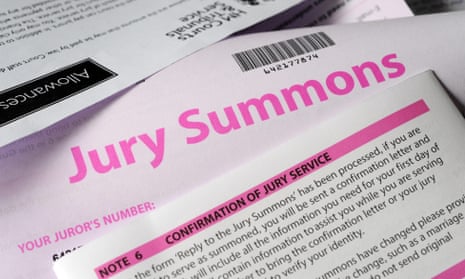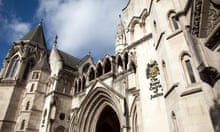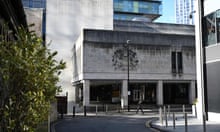Defendants should be allowed to opt for trial by judge rather than in front of a jury, a prominent human rights lawyer has proposed, as a means of partially restarting the criminal justice system.
Geoffrey Robertson QC, a barrister who has served as an international tribunal judge, believes British courts could follow many Australian states that permit the accused to choose a hearing without the traditional jury of 12 men and women.
Jury trials in England and Wales have stopped due to the coronavirus lockdown. Even before then, backlogs were building up in the criminal justice system because the Ministry of Justice rationed the number of sitting days in order to save money.
Jury trials involve packing a dozen people in close proximity into a court and retiring room. Like pubs and restaurants, juries may be one of the last institutions to resume if the threat of coronavirus lingers.
Quick GuideWill there be a second wave of coronavirus?
Show
In recent days the UK has seen a sudden sharp increase in Covid-19 infection numbers, leading to fears that a second wave of cases is beginning.
Epidemics of infectious diseases behave in different ways but the 1918 influenza pandemic that killed more than 50 million people is regarded as a key example of a pandemic that occurred in multiple waves, with the latter more severe than the first. It has been replicated – albeit more mildly – in subsequent flu pandemics. Until now that had been what was expected from Covid-19.
How and why multiple-wave outbreaks occur, and how subsequent waves of infection can be prevented, has become a staple of epidemiological modelling studies and pandemic preparation, which have looked at everything from social behaviour and health policy to vaccination and the buildup of community immunity, also known as herd immunity.
Is there evidence of coronavirus coming back in a second wave?
This is being watched very carefully. Without a vaccine, and with no widespread immunity to the new disease, one alarm is being sounded by the experience of Singapore, which has seen a sudden resurgence in infections despite being lauded for its early handling of the outbreak.
Although Singapore instituted a strong contact tracing system for its general population, the disease re-emerged in cramped dormitory accommodation used by thousands of foreign workers with inadequate hygiene facilities and shared canteens.
Singapore’s experience, although very specific, has demonstrated the ability of the disease to come back strongly in places where people are in close proximity and its ability to exploit any weakness in public health regimes set up to counter it.
In June 2020, Beijing suffered from a new cluster of coronavirus cases which caused authorities to re-implement restrictions that China had previously been able to lift. In the UK, the city of Leicester was unable to come out of lockdown because of the development of a new spike of coronavirus cases. Clusters also emerged in Melbourne, requiring a re-imposition of lockdown conditions.
What are experts worried about?
Conventional wisdom among scientists suggests second waves of resistant infections occur after the capacity for treatment and isolation becomes exhausted. In this case the concern is that the social and political consensus supporting lockdowns is being overtaken by public frustration and the urgent need to reopen economies.
However Linda Bauld, professor of public health at the University of Edinburgh, says “‘Second wave’ isn’t a term that we would use at the current time, as the virus hasn’t gone away, it’s in our population, it has spread to 188 countries so far, and what we are seeing now is essentially localised spikes or a localised return of a large number of cases.”
The overall threat declines when susceptibility of the population to the disease falls below a certain threshold or when widespread vaccination becomes available.
In general terms the ratio of susceptible and immune individuals in a population at the end of one wave determines the potential magnitude of a subsequent wave. The worry is that with a vaccine still many months away, and the real rate of infection only being guessed at, populations worldwide remain highly vulnerable to both resurgence and subsequent waves.
In an article for the Guardian, Robertson, who was born in Australia, argues: “We believe sentimentally that trial by jury is a defendant’s fundamental right – but why not give them the additional right to choose instead a reasoned verdict from a judge – as they have, for example, in most Australian states.
“That would get some courts back and running, even if barristers and judges have to argue through their face mask,s and it would be a boon to defendants with good cases who do not want justice delayed,” he wrote.
Furthermore, Robertson said: “There are cases in Britain where justice would be better served, and defendants would be better off, if they could choose trial by judge alone.
“Provision of [the Australian states’] jury waiver option will not lead to the demise of a form of trial that has so much public acceptance, in particular because it involves the public in the delivery of justice. None of the Australian states which allow defendants (but not prosecutors) to waive jury trials have moved on to abolish juries.”
Trial by a jury is a venerated practice, dating back to Anglo-Saxon times. However, there are already significant exceptions.
During the Troubles in Northern Ireland, cases involving paramilitaries were heard without a jury for fear of jury intimidation. Judges would hear evidence then sum up as though addressing a jury before delivering a verdict.
In 2007, Diplock courts, as they were known, were abolished except where Northern Ireland’s director of public prosecutions certifies the administration of justice might be impaired by a jury trial. A former soldier, Dennis Hutchings, is due to face trial in Belfast in a Diplock court this year.
Non-jury trials are also permitted in England and Wales where jury tampering is suspected. In one 2011 case, a recorder in north London had to discharge a jury and complete the trial on her own.
Early in the lockdown, the Scottish government suggested abandoning jury trials temporarily but had to drop the proposal following an outcry.
This month, Justice, a legal reform organisation, experimented with online trials in which jury members heard a case remotely from their homes. HM Courts and Tribunals Service (HMCTS) has said it has no plans for trials with juries participating from home.
Last week, it was announced “a judicial working group” has been established “to consider ways to restart some jury trials once it is safe to do so”. It includes representatives from the Law Society, Bar Council, Criminal Bar Association (CBA), HMCTS, Crown Prosecution Service and other agencies.
The Lord Chief Justice, Lord Burnett of Maldon, has said: “I personally don’t think it realistic to think the jury could be in a different place ... jury trials are the clearest example of what will be most difficult to get back to normal.”
The CBA, which represents barristers in England and Wales, fears jury trials are under threat. Its chair, Caroline Goodwin QC, said: “There is no substitution for both open and efficient justice by having a live trial in a physical space with jurors, barristers, a judge, witnesses and defendants all able to engage fully and solemnly with the full range of verbal, non-verbal and visual cues.”








